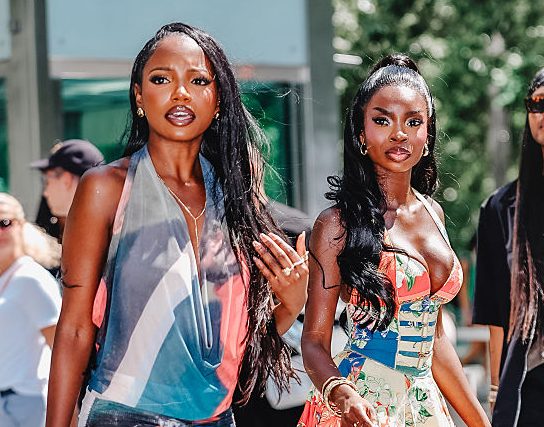The Black Chefs of The $600-Billion Dollar Industry
Share the post
Share this link via
Or copy link
By Steven Barboza
Americans are a fussy folk. Even during wartime and a Great Recession, we refuse to resort to comfort foods — meatloaf and mashed potatoes. Instead, we demand nouveau cuisine even if acquiring it means digging deeper into the grocery freezer.
Sylvia's is a landmark Harlem eatery
We are also an eating-out nation. Restaurants in the U.S. are projected to earn $580 billion in sales on some 70 billion meals and snacks this year, according to the National Restaurant Association. On a typical day, 130 million Americans eat out, spending $1.6 billion.
How much of this goes to black restaurateurs? Reportedly, 14% of first-line food service managers are black, while 4% of the nation’s restaurants are owned by African-Americans — comparatively few, but not an insignificant proportion.
There is no accurate count of how much black restaurateurs rack up in sales, but a simple extrapolation gives an inkling of the billions in question: If black restaurateurs earn their fair share of the $580 billion spent by diners yearly, that would equate to roughly $23 billion, making food service one of the highest grossing black-owned industries.
Where then are all the black chefs — and why are diners so hard-pressed to name more than one or two African American culinary stars? Have blacks finally forsaken the kitchen, leaving the stove and its longstanding legacy as a focal point of servitude for greener pastures?
Chef Joe Randall
The truth is, kitchens employ legions of blacks. And though the art of good cooking stems from blue collar roots, it is now a much-sought-after profession that attracts not only military veterans who got stuck with KP duty, but college graduates, entrepreneurs and even corporate honchos.
“You can go to a lot of restaurants now in the South,” Joe Randall, well-known chef, teacher and founding board member of the Southern Food Alliance, said. “I don’t care who the owner is and who’s out front, but if you look in the back, there’s black folks back in the kitchen. You have to understand, this is something that was relegated to black folks. This was the job that was open when other doors were closed. It wasn’t until 1977 that the U.S. Department of Labor reclassified chefs from domestics to professionals. So prior to 1977, there weren’t too many people who were interested in having their daughters or sons become chefs.”
The stars of modern cookery are a diverse bunch, and African Americans have earned a place among an elite corps of American masters. “Top Chefs,” a television series that’s really a battle royal of top flight cooks, features one of the hottest black chefs on the planet, and African Americans run some of the finest kitchens in the nation, even if they don’t have an ownership stake.
G. Garvin is one of the most popular black chefs
The who’s who of black chefs in America is a list of such luminaries as Marcus Samuelsson, Jacqueline Cholmondeley, Timothy Dean, Gerry Garvin, Melba Wilson, and Marvin Woods. They bring incredible diversity to the kitchen. Cholmondeley is from Guyana and has a background in European, Chinese, Portuguese, Indian, African and native South American Indian cookery. Samuelsson is from Ethiopia (his name was Kassahun Tsegie) but was raised in Sweden and taught to cook by his adoptive grandmother, Helga. Cholmondeley and Samuelsson were intensively trained in leading culinary institutes, Samuelsson in at the Culinary Institute in Gothenburg, Cholmondeley at the Culinary Institute of America.
There’s also the much-respected older generation — cooks who fought to put soul food on the culinary map. Raised in the cotton fields of South Carolina, Sylvia Woods earned a beautician’s license and opened a “farmhouse salon” in her hometown of Hemingway, eventually moving to Harlem, where she worked as a waitress before buying her employer’s luncheonette consisting of a counter and a few booths.
Today, Sylvia’s Restaurant, which employs a publicist along with cooks and caterers, is known worldwide and she has been crowned the “Queen of Soul Food.” Celebrities, politicians, African royalty and busloads of camera-toting Japanese tourists pay homage, vying for seating in this Harlem hotspot. She has been the subject of a minor media frenzy.
Sylvia has produced cookbooks and a line of food products, including “soulful seasoning” said to be good on “just about everything.” Her foundation has disbursed scholarships to local youth, and she has been lauded by major politicians, including presidents, mayors and others. In 2001, she rang the opening bell of the New York Stock Exchange.
Sylvia is not alone in her endeavors or entrepreneurial spirit. There are popular soul food establishments in most major U.S. cities, bulwarks against gentrification. They serve down-home, finger-licking cuisine whipped up by short-order black cooks. There are also upscale, linen-napkin, chicken-and-waffle joints, where you are perhaps as likely to see an Asian or white cook as a black one.
Industry experts point out that the majority of black cooks are “corporate contract feeders.”
“If you start looking at fine dining in New York and San Francisco and Chicago, you are not going to see many African Americans at all,” said Jason Wallace, owner of Hospitality Concepts LLC and a graduate of the Culinary Institute of America. He is also chairman of the New York Restaurant Association. He gave up kitchen work to run a consulting business.
“Restaurants are very demanding places to work,” he added. “If you’re willing to put in the hours and pay your dues, there’s opportunities in the food service industry. It’s up to the individual’s goals and objectives and their own tenacity.”
In the end, relatively few blacks become head chefs. “I know of less than 20 establishments that have black executive chefs in New York City,” he said.
Marcus Samulesson is world-renowned for his fusion cuisine
Most successful black chefs end up opening their own restaurants, he noted. “In order to be an executive chef, most black chefs are probably going to take their destiny in their own hands.” But this requires well-honed business savvy.
“You have to have some level of business understanding and knowledge, and most chefs are blue collar by nature, and hands-on, physically working in the kitchen,” notes Wallace. “They get emotional about their food.
“Business is another skill set — the ability to analyze, conceptualize and evaluate. Not a lot of chefs can do this. It’s about access to capital, investors, and real estate. It’s not a culinary challenge as much as it is a business and a retooling of themselves. Many chefs are great cooks but horrible managers. At the end of the day, I don’t care how good your soup is, but is your soup profitable?”
Marketing genius have turned a few black chefs into veritable household names. Gerry Garvin, a black celebrity chef, has his own TV show, “Turn Up the Heat with Chef G. Garvin.” He has parleyed his fame into cooking apparel, books, and spices. He reaches out to at-risk inner-city youth via his Culinary Boot Camp, where 16-19 year olds learn to slice, dice and prepare meals in an intensive five-day cooking course, aimed at preparing them for jobs in food service. The camp is an innovative way to bring fresh talent into the kitchen, and jumpstart careers.
Bernard Carmouche’s genius in the kitchen may be putting the “BAM!” into Emeril Lagasse’s empire. Bernard is Emeril’s number one guy,” said Samuelsson, “and in restaurant revenue that’s probably a $150 million organization.” Samuelsson named Chef Bernard as one of the black chefs he most admires.
Bernard began his kitchen career as a pot washer in a New Orleans restaurant. Today, he is chef de cuisine for Lagasse’s cooking empire, which includes cookbooks, TV and radio shows, kitchen products, restaurants and sports bars.
-

Beauty Of 5: Meet Wakati, The Newest Line Catered Specifically To Women With 4C Hair
-

She Tried It: Inahsi Naturals Aloe Hibiscus Leave-In Conditioner & Detangler
-

She Tried It: Ivy Park Drip 2 and 2.2 Black Pack
-

‘Always Work On Your Next Move’—Kandi Burruss Talks Leaving ‘Housewives,’ Broadway Wins, And Her Mogul Mindset
-

Not Just An Influencer—An Influence: How 'Just Add Hot Sauce' Creator Alex Hill Serves Food & Her Community
-

Angel Reese 1 Is Here: Inside The WNBA Star’s Debut Sneaker With Reebok
-

'This Is Really Home For Me' — Jerome Baker Talks Signing With Cleveland Browns, Giving Back & Entrepreneurship
-

'My Experience Shaped Everything'—Jimmy Akingbola Talks Wrapping ‘Bel-Air,’ Foster Care, And Transforming The Industry





